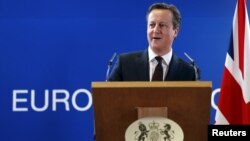The European Union said Friday key principles, including the freedom of movement, were not-negotiable in talks with Britain.
Margaritis Schinas, spokesman for European Commission President Jean-Claude Juncker, confirmed that the four freedoms in the treaty — free movement of goods, services, capital and people — are non-negotiable.
“They are non-negotiable because they are the essence of the EU," he said in a daily briefing.
The EU, however, expressed its readiness to work “constructively” with the new British government. Juncker contemplated the possibility of "minor" treaty changes in his comments last month, but ruled out any changes in regard to the four key treaty principles.
British Prime Minister David Cameron, whose Conservative Party won a sound majority in Thursday’s parliamentary elections, has pledged to hold a referendum on EU membership. Cameron has advocated changes to EU treaties, including migration.
European Council President Donald Tusk, a former Polish prime minister, said Friday he counted on the British prime minister to make the case for Britain’s continued membership in the 28-member-state union. Tusk said he was ready to help Cameron to do so.
"I am deeply convinced that there is no better life outside the European Union, for any country,” said Tusk. “A better EU is in the interest not only of Britain but of every member state."
In announcing his new government, Cameron said he wanted to make Britain “a place where a good life is in reach for everyone” who is willing to work and do the right thing. He also declared he would govern as the party of “one nation, one United Kingdom” — a clear reference to the rise of Scottish nationalism.
In a message on Twitter, Carl Bildt, a former prime minister and a former foreign minister of Sweden said Cameron’s slogan “one nation, one United Kingdom” was important, But he said he wished Cameron had added “one Europe.”
Prime Minister Cameron has promised to hold a referendum on the European Union by 2017.
Some information in this report was provided by AP, AFP and Reuters.





